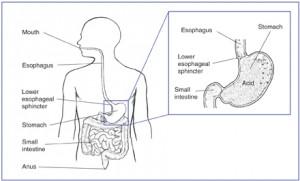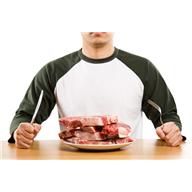How can you forget those amusing commercials  with various foods smacking the person eating it in the face?
with various foods smacking the person eating it in the face?
It isn’t because the food has an attitude, it’s a representation of the heartburn that that food will unleash after it’s eaten! Many people suffer from what we commonly know as heartburn.  Although I’m lucky enough to have never experienced it, it’s a hot topic that comes up quiet frequently in my studies. Heartburn is a term used to describe a symptom of acid reflux and is characterized by a burning feeling in the chest but the heart is not actually affected. Acid reflux is characterized by stomach acid splashing up into the lower esophagus, where it doesn’t belong. The splashing occurs because the pressure in the stomach is greater than the esophagus allowing the acid to creep up into the esophagus. Here are some simple, to the point facts about acid reflux.
Although I’m lucky enough to have never experienced it, it’s a hot topic that comes up quiet frequently in my studies. Heartburn is a term used to describe a symptom of acid reflux and is characterized by a burning feeling in the chest but the heart is not actually affected. Acid reflux is characterized by stomach acid splashing up into the lower esophagus, where it doesn’t belong. The splashing occurs because the pressure in the stomach is greater than the esophagus allowing the acid to creep up into the esophagus. Here are some simple, to the point facts about acid reflux.
Symptoms of acid reflux can go beyond stereotypical heartburn. Often, acid reflux causes regurgitation, which causes a sour taste in the mouth and can escalate to burping and even vomiting. Some people also feel bloated and nauseous after eating in addition to general stomach discomfort. If symptoms persist, the condition can be classified as gastroesophageal reflux disease, commonly known as GERD.
GERD usually occurs due to issues of the lower esophageal sphincter (LES). This ring like muscle at the base of the esophagus is supposed to keep stomach acid out of the esophagus. This is important because stomach acid severely damages the lining of the esophagus. The damage to the esophagus can get so bad that the cells can become cancerous. Check out this video for more information. There may be some people who actually suffer from GERD due to H. pylori or other bacterial overgrowth in the digestive system.  Stress and obesity can make GERD worse.
Stress and obesity can make GERD worse.
It’s pretty apparent that acid reflux is no joke. So what can be done about it? Sure, you can take the antacid in the wacky commercial but you can also make simple lifestyle changes. Making dietary changes can have a major impact on the symptoms of acid reflux.
Here are some diet tips to decrease heartburn: 
- Decrease amount of acidic foods in the diet.
- Eat small frequent meals. Large meals cause excess acid production in the stomach.
- If you’re a smoker, consider quitting. Nicotine can weaken the LES making it easier for the stomach acid to reach the esophagus.
- Weight reduction if overweight. There is evidence that losing some pounds decreases symptoms of acid reflux.
- Avoid irritating foods by keeping a food journal so you can record the foods that cause heartburn.
- Eat slowly.
- Avoid tight fitting clothes around the abdomen.
- Try not to go to bed on a full stomach.
 Limit these foods which may trigger GERD as needed:
Limit these foods which may trigger GERD as needed:
- Alcohol
- Black and red pepper
- Carbonated beverages
- Chocolate
- Coffee
- Garlic
- High fat foods including anything fried, hot dogs, salami, bacon and sausage

- Mint
- Onions
- Anything that is not tolerated and you find exacerbates acid reflux symptoms
There are many heartburn friendly recipes and books that can help you eat a diet that alleviates acid reflux. Check out these books for recipe ideas, all found at amazon.com:
- The Complete Idiot’s Guide to the Acid Reflux Diet by Maria A. Bella, MS, RD, CDN
- Dropping Acid: The Reflux Diet Cookbook & Cure by Jamie Koufman, M.D., Jordan Stern, M.D. and French Master Chef, Marc Michel Baue
- The Acid Reflux Solution: A Cookbook and Lifestyle Guide for Healing Heartburn Naturally by Jorge E. Rodriguez, M.D. and Susan Wyler, M.P.H., R.D.
- Eating for Acid Reflux: A Handbook and Cookbook for Those with Heartburn by Jill Sklar, Annabel Cohen and M.D. Manuel Sklar M.D.
If you suffer from heartburn, making different food choices can help make eating not such a slap in the face. For others, their condition might be more serious and if diagnosed with GERD, they will most likely need the help of over the counter or even prescription medications. You may want to ask your doctor to check you for H. pylori or other gastrointestinal bacterial overgrowth. It is best to get on a treatment plan including diet and lifestyle changes to decrease chronic esophageal inflammation and complications.
by Nicole Sellers-Hansen
Eat Fit Health, Intern
Drexel University Graduate Student, MS in Human Nutrition
ACSM Certified Personal Trainer